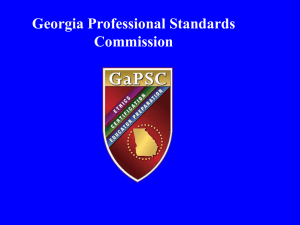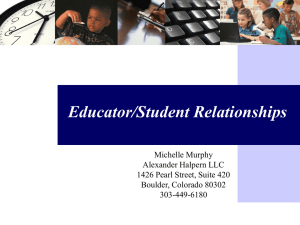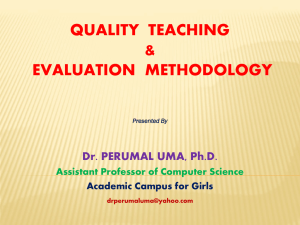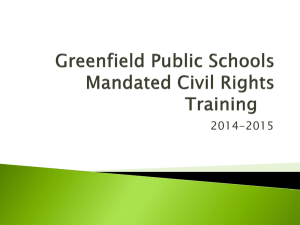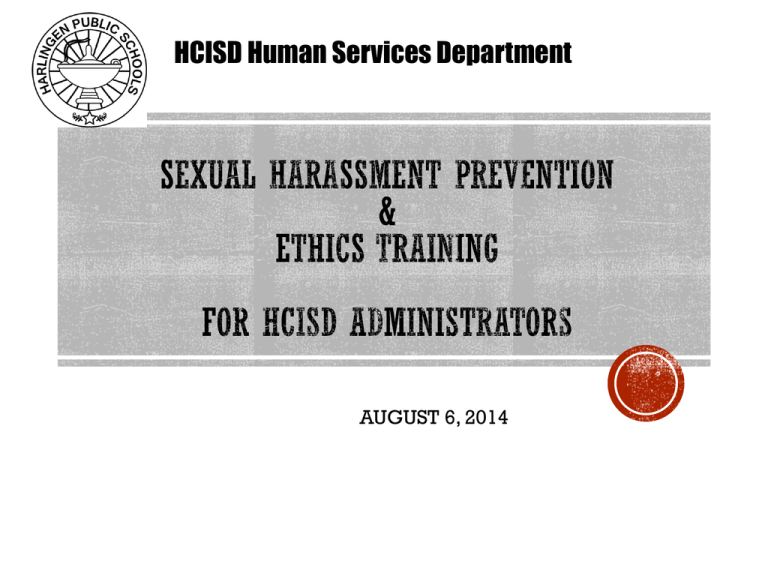
HCISD Human Services Department
AUGUST 6, 2014
Define/identify/prevent sexual harassment.
Identify and address behaviors that constitute sexual
harassment.
Internalize HCISD’s standards of behavior and ethics.
Train and implement the HCISD’s policies prohibiting
sexual harassment.
Train and implement the HCISD’s ethical standards of
conduct.
Implement training for your campuses/departments to
promote high ethical standards and to safeguard your
students and staff from sexual harassment and
inappropriate activity.
Ensure employees understand the ramifications of
violating state and federal law and / or HCISD Board
Policy .
HCISD Human Services Department
SEXUAL HARASSMENT
PREVENTION
August 2014
Sexual harassment is defined as
any unwelcome sexual advances,
requests for sexual favors
and other verbal or physical
conduct of a sexual nature.
EXAMPLES:
• Unwelcomed
• Can be physical, verbal or nonverbal
• Severe and pervasive
• Unreasonably interferes with an individual’s
work performance
Quid Pro Quo: A form of sexual harassment typically
only supervisors, those with supervisory authority, or
teachers/instructors can engage in. Requires an
individual to choose between submission or a negative
consequence for failure to submit.
Hostile Environment: Making unwelcome sexual
advances or other verbal or physical conduct of a sexual
nature with the purpose of, or that creates the effect of,
unreasonably interfering with an individual's work
performance or creating an intimidating, hostile or
offensive working environment.
Hostile Work Environment
See DIA (LEGAL) & DIA (LOCAL)
Unreasonable interference, intimidation, abuse
Typically repetitive rather than a single episode
Verbal - sexual comments about appearance, innuendoes, off-color
jokes, vulgar or explicit language or questions, Including Text/picture
messages.
Non-Verbal - unsolicited or inappropriate gifts of a sexual nature,
suggestive notes, nude or suggestive photos or materials, staring, email.
Physical - touching, rubbing or brushing in a sexual manner, uninvited
massages, uninvited hugging or kissing.
Visual - Posters, drawings, pictures, screensavers, emails or text of a
sexual nature.
Standards of Conduct:
Electronic communication and
Social Media
See DH (LEGAL) & DH (LOCAL)
3.9 The educator shall refrain from inappropriate
communication with a student or minor, including,
but not limited to, electronic communication such as
cell phone, text messaging, email, instant
messaging, blogging, electronic forums (chat
rooms), video-sharing, or other social network
communication.
USE OF ELECTRONIC
COMMUNICATION WITH STUDENTS
DH(LOCAL)
A certified or licensed employee, or any other
employee designated in writing by the
Superintendent or a campus principal, may use
electronic media to communicate with currently
enrolled students about matters within the scope of
the employee’s professional responsibilities.
All other employees are prohibited from using
electronic media to communicate directly with
students who are currently enrolled in the District.
Factors that may be considered in assessing
whether the communication is inappropriate
include, but are not limited to:
See DH (LOCAL) & DH (EXHIBIT)
(i) The nature, purpose, timing, and amount of the communication;
(ii) The subject matter of the communication;
(iii) Whether the communication was made openly or the educator
attempted to conceal the communication;
(iv) Whether the communication could be reasonably interpreted as
soliciting sexual contact or a romantic relationship;
(v) Whether the communication was sexually explicit; and
(vi) Whether the communication involved discussion(s) of the
physical or sexual attractiveness or the sexual history,
activities, preferences, or fantasies of either the educator
or the student.
STATE BOARD FOR
EDUCATOR CERTIFICATION (SBEC):
A certified educator holds a unique position of
public trust with almost unparalleled access to
the hearts and minds of impressionable
students. Therefore, the conduct of an educator
must be held to the highest standard.
HCISD BOARD POLICIES
DIA (LOCAL)
The District prohibits discrimination, including
harassment, against any employee on the basis of race, color, religion,
gender, national origin, age, disability, or any other basis prohibited by
law. Retaliation against anyone involved in the complaint process is a
violation of District policy.
FFH (LOCAL)
“An employee shall not form romantic or other inappropriate social
relationships with students. Any sexual relationship between a student
and a District employee is always prohibited, even if consensual
HCISD BOARD POLICIES
FO (LOCAL) : CORPORAL PUNISHMENT
The Board prohibits the use of corporal punishment in the District. Students
shall not be spanked, paddled, or subject to other physical force as a means of
discipline for violations of the Student Code of Conduct.
PHYSICAL RESTRAINT
Within the scope of an employee’s duties, a District employee may physically
restrain a student if the employee reasonably believes restraint is necessary in
order to:
1. Protect a person, including the person using physical restraint, from physical
injury.
2. Obtain possession of a weapon or other dangerous object.
3. Remove a student refusing a lawful command of a school employee from a
specific location, including a classroom or other school property, in order to
restore order or to impose disciplinary measures.
4. Control an irrational student.
5. Protect property from serious damage.
HCISD BOARD POLICIES
FOF (LEGAL) :STUDENT DISCIPLINE: STUDENTS WITH DISABILITIES
RESTRAINT: A school employee, volunteer, or independent contractor may
use restraint only in an emergency and with the following limitations:
1. Restraint shall be limited to the use of such reasonable force
as is necessary to address the emergency.
2. Restraint shall be discontinued at the point at which the emergency
no longer exists.
3. Restraint shall be implemented in such a way as to protect the
health and safety of the student and others.
4. Restraint shall not deprive the student of basic human necessities
.
19 TAC 89.1053(c)
HCISD BOARD POLICIES
FOF (LEGAL) :STUDENT DISCIPLINE: STUDENTS WITH
DISABILITIES (continued)
“Restraint” means the use of physical force or a mechanical device to
significantly restrict the free movement of all or a portion of a student’s body.
“Emergency” means a situation in which a student’s behavior poses a threat of:
1. Imminent, serious physical harm to the student or others; or
2. Imminent, serious property destruction.
19 TAC 89.1053(b)(1)–(2)
TRAINING:
Training for school employees, volunteers, or independent contractors
regarding the use of restraint shall be provided according to the
requirements set forth at 19 Administrative Code 89.1053(d).
SEE DIA(LOCAL) AND FFH (LOCAL)
As an administrator of Harlingen CISD, you have a duty
to provide a learning and working environment that is
free of unlawful harassment including but not limited
to sexual harassment.
Further, as an administrator of Harlingen CISD, you
are expected to:
* Model desired ethical behavior.
* Stop any type of unwanted behavior by saying NO
and reporting the behavior immediately.
* Train your employees to stop any type of unwanted
behavior by saying NO and reporting the behavior to
you immediately.
Remember that liability begins when you are
deliberately indifferent
When one who has the authority to
address the alleged discrimination and
to institute corrective measures has
actual knowledge of discrimination and
fails to adequately respond.
Gebser v. Lago Vista ISD
118 S. Ct. 1989 (1998)
Strict Liability – Liability that does not
depend on actual negligence or intent
to harm, but that is based on the
breach of an absolute duty to make
something safe.
Vicarious Liability – Liability that an
employer bears for the actionable
conduct of an employee based on the
relationship between the two parties.
HCISD Human Resources Department
HCISD Human Services Department
AUGUST 2014
HCISD Human Services Department
ETHICS IN THE WORKPLACE
AUGUST 2014
The Texas educator shall comply with standard practices and ethical
conduct toward students, professional colleagues, school officials, parents,
and members of the community and shall safeguard academic freedom. The
Texas educator, in maintaining the dignity of the profession, shall respect and
obey the law, demonstrate personal integrity, and exemplify honesty.
The Texas educator, in exemplifying ethical relations with colleagues, shall
extend just and equitable treatment to all members of the profession. The
Texas educator, in accepting a position of public trust, shall measure success
by the progress of each student toward realization of his or her potential as an
effective citizen. The Texas educator, in fulfilling responsibilities in the
community, shall cooperate with parents and others to improve the public
schools of the community.
DH(LOCAL)
An employee shall not form
romantic or other inappropriate
social relationships with students.
Any sexual relationship between a
student and a District employee is
always prohibited, even if
consensual. [See FFH]
An employee shall not use tobacco
products on District premises, in
District vehicles, or at school or
school-related activities. [See
also GKA]
An employee shall not manufacture, distribute, dispense, possess, use, or
be under the influence of any of the following substances during
working hours while at school or at school-related activities during or
outside of usual working hours:
1.
Any controlled substance or dangerous drug as defined by law,
including but not limited to marijuana, any narcotic drug,
hallucinogen, stimulant, depressant, amphetamine, or barbiturate.
2.
Alcohol or any alcoholic beverage.
3.
Any abuseable glue, aerosol paint, or any other chemical substance
for inhalation.
4.
Any other intoxicant, or mood-changing, mind-altering, or
behavior-altering drug.
An employee need not be legally intoxicated to be considered
“under the influence” of a controlled substance.
See DH LOCAL
The dress and grooming of a District employee shall be
clean, neat, in a manner appropriate for his or her
assignment, and in accordance with the following
standards:
An employee shall be are expected to dress in a manner
that projects a professional image for the employee,
District, and community.
Style of clothing for males and females shall always
reflect a professional and business-like atmosphere.
Dresses, slacks, skirts, and blouses for females should not
attract unfavorable attention. Males shall be expected to
wear slacks, shirts, or appropriate professional attire.
Administrators and supervisors shall have the discretion
to determine appropriateness of attire for all personnel in
certain grades or subjects (physical education,
agriculture, auto mechanics, building trades, special
education), or for medical necessities. [See also DH]
The following standards shall apply:
Cleanliness and neatness are expected of all staff at all times.
Halters, garments with bare shoulders, bare backs, tank tops,
spaghetti straps, muscle shirts, see-through garments, and
revealing or provocative necklines shall not be permitted. In
addition, clothing with symbols, inappropriate language, phrases
or slogans advertising tobacco, alcohol products, controlled
substances or political advertisements is unacceptable.
Blue denim jeans or blue denim capri pants shall not be worn on
days when students are in regular attendance except for special
emphasis days with the approval of the principal. When denim
clothing is designated, it shall be clean and neat with no holes,
extreme fading, or worn look.
See DH LOCAL
X
An employee shall notify his or her principal or immediate
supervisor within three calendar days of any arrest, indictment,
conviction, no contest or guilty plea, or other adjudication of the
employee for any felony, any offense involving moral turpitude,
and any of the other offenses as indicated below:
Crimes involving school property or funds;
Crimes involving attempt by fraudulent or unauthorized
means to obtain or alter any certificate or permit that
would entitle any person to hold or obtain a position as an
educator;
See DH LOCAL
Crimes that occur wholly or in part on school property or at
a school-sponsored activity; or
Crimes involving moral turpitude, which include:
Dishonesty; fraud; deceit; theft; misrepresentation;
Deliberate violence;
Base, vile, or depraved acts that are intended to arouse or
gratify the sexual desire of the actor;
Felony possession or conspiracy to possess, or any misdemeanor
or felony, transfer, sale, distribution, or conspiracy to transfer, sell,
or distribute any controlled substance defined in Chapter 481 of the
Health and Safety Code;
Felony driving while intoxicated (DWI) or; Acts constituting
public intoxication, operating a motor vehicle while under the
influence of alcohol, or disorderly conduct, if any two or more
acts are committed within any 12-month period;
Acts constituting abuse or neglect under the Texas Family Code.
See DH LOCAL
What kinds of behavior can lead to disciplinary action by SBEC?
SBEC may take disciplinary action against a certified educator (employee)
for the following reasons:
1. An educator (employee) has conducted school or education activities in
violation of law;
2. An educator (employee) is unworthy to instruct or supervise the youth of the
state;
3. An educator (employee) has violated the Code of Ethics;
4. An educator (employee) has failed to report or has hindered the reporting of
child abuse or the known criminal history of an educator as required by law
and Board rules;
5. An educator (employee) has abandoned his or her contract;
6. An educator (employee) has failed to cooperate with a Board investigation;
7. An educator (employee) has been convicted of a crime directly related to the
duties and responsibilities of the education profession, or
8. An educator (employee)has violated the security or integrity of a state
assessment.
The above list is not exclusive. SBEC may take disciplinary action
against an educator on other grounds or measures available by law.
What kinds of crimes does SBEC consider to be directly
related to the duties and responsibilities of the
education profession?
1. Any crime involving moral turpitude;
2. Any crime involving sexual or physical abuse of a minor or student or other
illegal conduct with a minor or student;
3. Any crime for which the underlying facts would support a felony conviction for
possession, transfer, sale, distribution, or conspiracy to possess, transfer, sell,
or distribute any controlled substance;
3. Any crime involving school property or funds;
4. Any crime involving an attempt by fraudulent or unauthorized means to obtain or
alter any certificate or permit that would entitle a person to hold or obtain a
position as an educator;
5. Any crime that occurs wholly or in part on school property or at a schoolsponsored activity; or
7. Felonies involving driving while intoxicated.
DH (LOCAL)
No, SBEC can investigate and discipline anyone who holds a
certificate issued under Chapter 21, Subchapter B of the Texas
Education Code. This includes teachers, librarians, counselors,
educational diagnosticians, administrators and paraprofessionals.
HCISD will investigate and discipline any employee who violates
state or federal law or board policy.
HCISD Human Resources Department
AS HCISD ADMINISTRATORS
IT IS YOUR RESPONSIBILITY TO:
Provide sexual harassment prevention and ethics
training to every employee on an annual basis;
Provide sexual harassment prevention and ethics
training to mid-year hires;
Ensure that staff attendance for Sexual Harassment
Prevention Training and Ethics Training is
documented in Eduphoria for your information and for
accessibility to Human Services.
Define Sexual Harassment
Define and detail Ethics as
HCISD
Sexual
Harassment
Prevention
&
Ethics
Training
expected at HCISD
Give examples of each
Identify and review District
policies
Direct employees to self advocate,
say NO, and report sexual
harassment and unethical behavior
immediately
Duty to respond promptly
Take all claims seriously
Investigate all claims – even if formal complaint
not filed
Reduce oral complaints to writing
Use consistent investigation procedures
Meaningful investigation
HCISD Administrators Tool Kit
Log In
Please enter the user name and password below to access the
Administrators Tool Kit, then click the Login button.
ENTER USER NAME :
ENTER PASSWORD :
Follow up on all relevant information
Do not ignore prior complaints against alleged
harasser
Follow timelines and procedures set out in HCISD
Board Policy DIA (LOCAL)
Issue final report to District Title IX Coordinator
Follow documentation format and procedures
Utilize resources available to you including, but not
limited to, the HCISD Administrator Tool Kit
HCISD Human Resources Department




